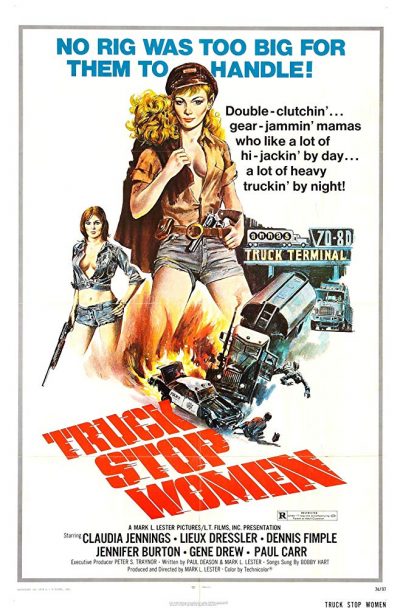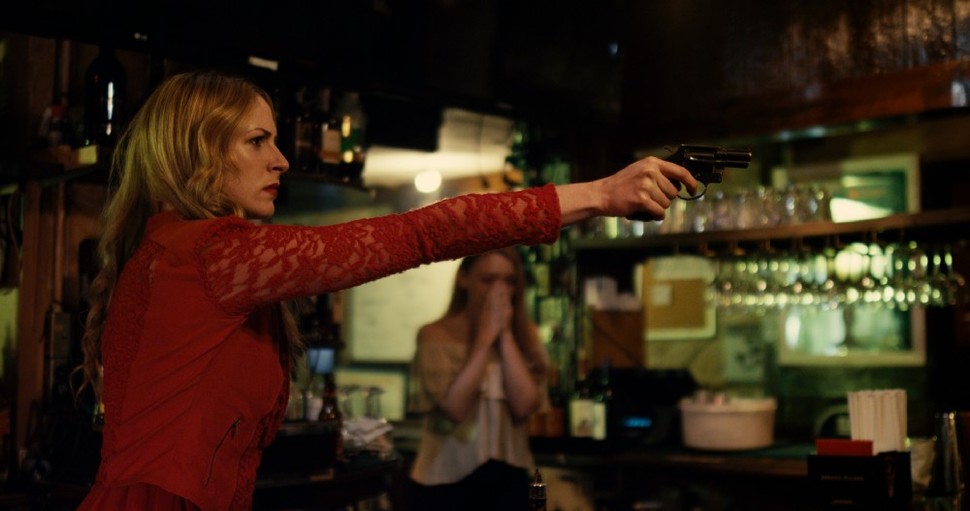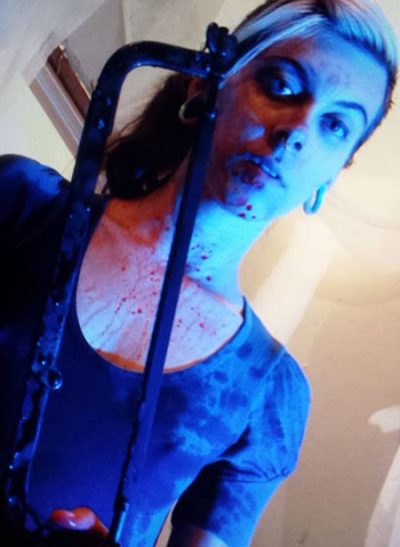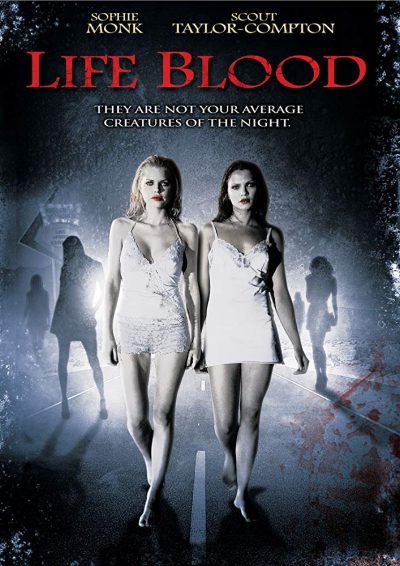★½
“You’ll need a break.”
 Within about two minutes of starting this, I realized I had made a terrible mistake, and was watching something barely reaching the amateur level of film production. Still, I soldiered on – albeit for some loose definition of “soldiered” – until the bitter end, mostly so I could issue an informed warning about this to any prospective viewers. Maxine (Mitchell) is rather upset when she discovers her boyfriend, music video producer Lance (Watts) has been cheating on her with Lana (Bryant). Mind you, she’s clearly a bit unhinged already: for example, telling him she’s pregnant when she isn’t. So it’s not much of a surprise when her reaction to his two-timing is to kidnap Lance, tie him up in her basement and submit him to various indignities, along with seeking revenge on Lana. Which, apparently, includes sleeping with her father (Walker).
Within about two minutes of starting this, I realized I had made a terrible mistake, and was watching something barely reaching the amateur level of film production. Still, I soldiered on – albeit for some loose definition of “soldiered” – until the bitter end, mostly so I could issue an informed warning about this to any prospective viewers. Maxine (Mitchell) is rather upset when she discovers her boyfriend, music video producer Lance (Watts) has been cheating on her with Lana (Bryant). Mind you, she’s clearly a bit unhinged already: for example, telling him she’s pregnant when she isn’t. So it’s not much of a surprise when her reaction to his two-timing is to kidnap Lance, tie him up in her basement and submit him to various indignities, along with seeking revenge on Lana. Which, apparently, includes sleeping with her father (Walker).
If this all sounds like completely ludicrous and implausible nonsense… I have done my job as a reviewer, because that’s exactly what it is, buttressed by poor audio quality, questionable directorial decisions (the conversation where the camera spins around the participants like a hyperactive house-fly was an especially dubious choice) and a final twist which managed to be both out of left field and entirely predictable at the same time. About the only thing which I did quite like, was the way Maxine’s personality splits into two distinct characters. One is urging her on to do ever more malicious deeds, while the other is trying to take a higher moral path. Surprisingly – considering the ineptness everywhere else – it’s decently handled on both sides of the camera. Even if I doubt anyone ever thought, “I want an erotic thriller which largely avoids actually nudity, with a black, female version of Gollum in it,” this aspect is likely responsible for this avoiding a dreaded and rarely awarded one-star rating.
I was amused by the po-faced disclaimer from the director which opens this: “Due to my strong convictions, I wish to stress that this film in no way endorses support of violence, abuse against women or other subject matter that may be considered offensive.” Several points come to mind. Firstly, if you have to add a disclaimer to your film like that, you’re doing it wrong. Secondly, it’s little more than empty virtue signaling anyway: It’d be far more notable if a director stated “I wholeheartedly endorse violence.” Thirdly, any abuse here is far more by women: what is Mr. Fiori’s stance on that? Sadly, it appears we will never know, save for the unlikely event of there being a SheChotic 2. Fourthly and finally, it’s never a good sign when the text which starts your movie is worthy of deeper analysis and commentary than 95% of what follows it. Though if it had instead simply read, “Abandon hope all ye who enter here,” it would certainly have been equally valid.
Dir: Leandre Fiori
Star: Erica Mitchell, Robert D Watts, Brittany Bryant, Jason Walker





 Ostensibly, Anna (Dressler) runs a New Mexico truck-stop, catering to drivers and ensuring they are kept fed and watered as they run their rigs across country. However, she has several more lucrative businesses. It seems that a majority of her waitresses, for example, moonlight as hookers in the brothel Anna runs. But the key side-line of work is sending her gals out to lure in unsuspecting truckers, typically with an alluring combination of fake breakdowns and tight shorts. When the truckers stop, their vehicles are hijacked, the contents stolen and the trucks themselves repainted and sold on.
Ostensibly, Anna (Dressler) runs a New Mexico truck-stop, catering to drivers and ensuring they are kept fed and watered as they run their rigs across country. However, she has several more lucrative businesses. It seems that a majority of her waitresses, for example, moonlight as hookers in the brothel Anna runs. But the key side-line of work is sending her gals out to lure in unsuspecting truckers, typically with an alluring combination of fake breakdowns and tight shorts. When the truckers stop, their vehicles are hijacked, the contents stolen and the trucks themselves repainted and sold on.
 First, the good news. Whatever the issue was with
First, the good news. Whatever the issue was with  There are times when I feel I need a ★¾ rating. Two stars here would suggest a degree of genuine competence, which this undeniably lacks. But on the other hand, ★½ suggests something which is largely unmemorable, and that isn’t the case either. You won’t forget this. In particular, you won’t forget the scene where the heroine yanks some (suspiciously sausagey) intestines out of a victim, rubs them over her face and then – there’s no other way to describe this – masturbates the intestines. That’s three words I never thought I would write in a row. On that basis (and that basis alone), I’ll err on the side of generous.
There are times when I feel I need a ★¾ rating. Two stars here would suggest a degree of genuine competence, which this undeniably lacks. But on the other hand, ★½ suggests something which is largely unmemorable, and that isn’t the case either. You won’t forget this. In particular, you won’t forget the scene where the heroine yanks some (suspiciously sausagey) intestines out of a victim, rubs them over her face and then – there’s no other way to describe this – masturbates the intestines. That’s three words I never thought I would write in a row. On that basis (and that basis alone), I’ll err on the side of generous. For whatever reason – presumably misguided stylistic reasons – the great bulk of the film is buried in darkness. Seriously, three-quarters of the film feels like it’s illuminated solely by natural lighting. And given it mostly takes place underground, in rooms with no windows, this is a major problem. The movie reaches its literally darkest moment during an early scene where the camera pans over an underlit set to an even more underlit door where someone has entered to deliver a message. You cannot see who it is. You just hear a disembodied voice, before the camera pans back. It’s a horrible mis-step, whether due to poor shooting, a poor transfer, or a bit of both. It largely dooms the movie, to the point where even an energetic final third is unable to rescue proceedings. For how can you begin to enjoy something you can’t see?
For whatever reason – presumably misguided stylistic reasons – the great bulk of the film is buried in darkness. Seriously, three-quarters of the film feels like it’s illuminated solely by natural lighting. And given it mostly takes place underground, in rooms with no windows, this is a major problem. The movie reaches its literally darkest moment during an early scene where the camera pans over an underlit set to an even more underlit door where someone has entered to deliver a message. You cannot see who it is. You just hear a disembodied voice, before the camera pans back. It’s a horrible mis-step, whether due to poor shooting, a poor transfer, or a bit of both. It largely dooms the movie, to the point where even an energetic final third is unable to rescue proceedings. For how can you begin to enjoy something you can’t see? Struggling artist Summer (Oldham) takes on a temporary job as a phone-sex operator to make ends meet. It gives her a very jaundiced view of men, having had to plunge into the worst and most sordid depths of their fantasies. After realizing that some pose a more direct threat, and funded by hush money from one of her customers, she buys the car of the title. and takes their information, along with the tapes she has recorded of them, on a little road-trip across the South and West of America. She’s heading towards her sister (Hinchley), bringing the perverts to justice as she goes, and seeking closure for her own past.
Struggling artist Summer (Oldham) takes on a temporary job as a phone-sex operator to make ends meet. It gives her a very jaundiced view of men, having had to plunge into the worst and most sordid depths of their fantasies. After realizing that some pose a more direct threat, and funded by hush money from one of her customers, she buys the car of the title. and takes their information, along with the tapes she has recorded of them, on a little road-trip across the South and West of America. She’s heading towards her sister (Hinchley), bringing the perverts to justice as she goes, and seeking closure for her own past. Despite a startling cover, this isn’t as sleazy as it seems. Indeed, even the title appears to be erring on the side of restraint, having apparently avoided the more obvious (and arguably, accurate) one of Killer Pussy. While the heroine certainly has an… interesting choice of costume, that’s as far as the film wants to go. It’s an odd approach: a sleeve like that sets up certain sets of expectations, which the movie has no apparent interest in matching. It’s not as if anyone of a sensitive nature is going to have got past the cover, so it seems odd to exercise such self-discipline when it comes to the content.
Despite a startling cover, this isn’t as sleazy as it seems. Indeed, even the title appears to be erring on the side of restraint, having apparently avoided the more obvious (and arguably, accurate) one of Killer Pussy. While the heroine certainly has an… interesting choice of costume, that’s as far as the film wants to go. It’s an odd approach: a sleeve like that sets up certain sets of expectations, which the movie has no apparent interest in matching. It’s not as if anyone of a sensitive nature is going to have got past the cover, so it seems odd to exercise such self-discipline when it comes to the content. You could skip the first 30-45 minutes of this, and it really would not affect your enjoyment level significantly. It seems to be one of those cases where the director is far more in love with the dialogue and characters than they deserves, and so we have to sit through far too much flapping of jaws by the latter, delivering the former in inane and uninteresting conversation, before we get to the meat of the story. Which is, as follows.
You could skip the first 30-45 minutes of this, and it really would not affect your enjoyment level significantly. It seems to be one of those cases where the director is far more in love with the dialogue and characters than they deserves, and so we have to sit through far too much flapping of jaws by the latter, delivering the former in inane and uninteresting conversation, before we get to the meat of the story. Which is, as follows. There’s a fascinating idea at the core here. Namely, that vampires were created by God, in order to mitigate mankind’s sin by preying on the most evil examples of humanity. They’re effectively angelic enforcers. The potential in this is great. The execution, however… Well, it largely comes down to two such vampire/angels sitting around a gas station for the majority of the running time. This isn’t the only aspect which is poorly considered. It starts in 1969, when lesbian couple Brooke (Lahiri) and Rhea (Monk) are at a New Year’s party. Brooke kills a rapist, stabbing him (literally) 87 times, and the pair then flee. In the desert, they are visited by God (model Angela Lindvall), who makes Rhea into one of her enforcers.
There’s a fascinating idea at the core here. Namely, that vampires were created by God, in order to mitigate mankind’s sin by preying on the most evil examples of humanity. They’re effectively angelic enforcers. The potential in this is great. The execution, however… Well, it largely comes down to two such vampire/angels sitting around a gas station for the majority of the running time. This isn’t the only aspect which is poorly considered. It starts in 1969, when lesbian couple Brooke (Lahiri) and Rhea (Monk) are at a New Year’s party. Brooke kills a rapist, stabbing him (literally) 87 times, and the pair then flee. In the desert, they are visited by God (model Angela Lindvall), who makes Rhea into one of her enforcers.